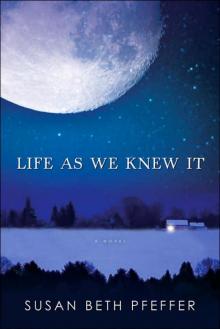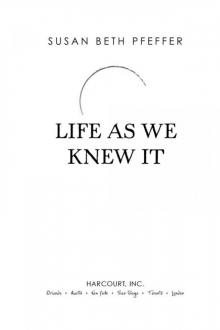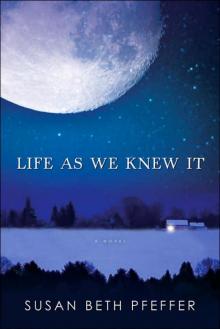- Home
- Susan Beth Pfeffer
Getting Even Page 10
Getting Even Read online
Page 10
“So how’s Muriel?” Chris asked, once they’d ordered.
“I thought her name name was Mariel, Chris,” Annie said.
“She’s just fine,” Bob said. “She’s looking forward to seeing you again, Chris.”
“Chris told me you and Mariel are going on a wedding trip,” Annie said. “But he didn’t tell me where you’re going.”
“Just Paris,” Bob replied. “Just for a week.”
“Oh,” Annie said, trying hard not to sigh. Paris must be incredible in autumn. Bob must be incredible in Paris.
“Have you been to Paris?” Bob asked Annie.
“Only in my dreams,” Annie replied. “My mother studied there, though, so I feel like I’ve been there. All the stories she’s told me.”
“The Powells are nice people, Dad,” Chris said.
“Of course they are,” Bob said. “That’s obvious, simply from meeting their daughter.”
Annie wished she could introduce Bob to Murray Levine. Murray could learn a lot about public relations from spending twenty minutes in Bob’s company.
Annie looked surreptitiously at Bob and Chris. Under ordinary circumstances, she’d be impressed with how at ease Chris was in such a high-class place. She’d admired that about Ned Brundege the summer before, that sense that he was accustomed to being at the best places, and therefore never even thought to worry that he might have a piece of spinach clinging to his front teeth.
Only Chris didn’t look especially at ease. It wasn’t that he kept running his tongue over his teeth, but he was clearly uncomfortable. And even if he had been acting as though he’d been born there, he still would have paled in comparison to his father.
Annie had the strong sense that everybody at the restaurant had cast at least one look at their table, and it was Bob who was the focus of their attention. He was so tan and silver and gorgeous.
And even though he could hardly be fascinated by his son’s seventeen-year-old girlfriend he gave her his full attention. Chris’s father was a perfect gentleman, and Annie felt dizzy with pleasure just to be spending the evening with him.
They made it through dinner, mostly discussing some of Bob’s more interesting cases, and all the famous celebrities he knew in LA. Annie loved it, even though Chris seemed bored. Annie figured he’d already heard it. She didn’t care. She’d spent the day sending bills out to some of Boston’s least famous people, people like Irvin Weinstock who were thrilled to spend an hour answering questions about gum disease on the local radio.
In a moment of daring, Annie tried out her Irvin Weinstock story on Bob, and he laughed at all the right points, especially when she told him Charlene’s concern with AIDS. She couldn’t get over how special Bob made her feel. What a fool Chris’s mother must have been to let him get away.
Dinner was over all too soon. Annie would have loved a dessert, but she sensed that Bob wasn’t the whipped cream sort, so she passed up the offer. Chris had barely touched his dinner, she noticed, but that sort of restaurant wasn’t such a big thrill for him.
They went on to the club where Murray’s client’s chicky was performing. The place was crowded, but since Murray had arranged their reservations, they had no trouble being seated.
“I hope this singer is all right,” Annie said, as soon as they had settled in. “All I know about her is that my boss’s client is having an affair with her. And that’s not exactly a recommendation.”
“It will be an adventure,” Bob declared. “At best, we’ll be discovering a rare new talent. And at worst, she’ll be so dreadful we’ll be able to laugh for years to come.”
“At worst she’ll be mediocre,” Chris said. “And we’ll be bored.”
“Nothing about this evening could bore me,” Bob said. “Not when it’s been spent in such enchanting company.”
“That’s very kind of you, Bob,” Annie said. “But Chris is right. There’s every chance this singer will simply be nothing.”
“Then I’ll give you my undivided attention,” Bob said. “And be pleased not to be distracted.”
“I have to go to the ladies’ room,” Annie choked out. She smiled, and left the table as fast as she could. It wasn’t until she escaped to the privacy of the ladies’ room that she felt free to let out the whoop of laughter that had been welling inside her.
It was so fabulously silly. No wonder all those women married him all the time. And no wonder he didn’t ever stay married to them. It must be exhausting to maintain that level of adoration seven days a week. Annie tried to picture her father talking to her mother the way Bob talked, and that just made her laugh all the harder. She didn’t care what the other people in the ladies’ room must think of her, it was such an absurd picture.
When she had calmed down sufficiently she walked back to the table. Bob, she noted, was saying something to Chris, who didn’t seem to be listening. She smiled at both of them and gave Chris’s hand a quick squeeze. He didn’t squeeze back, but she figured he was probably shy about showing affection in front of his father. Amateurs never like performing in front of professionals.
Which reminded her of why they were at the club. It looked like a respectable enough place, and the crowd seemed well dressed enough. Maybe chicky wouldn’t be a disaster.
“Chris told me so much about you, but he never told me just how special you are,” Bob declared. “I suppose he wanted to keep that secret to himself.”
“Thank you,” Annie said.
“I told you how special she is,” Chris muttered. “Oh, forget it.”
“I think Chris is pretty special too,” Annie said. “Sometimes I think of that moment when we met, and I realize how lucky I was that I was reaching for the book I wanted, and he was reaching for the one he wanted, at just the right moment.”
“Chris didn’t tell me anything about that,” Bob said. “What’s this about books?”
“We met at a bookstore,” Annie said. “I was looking at a book called Make Your Anger Work for You, and Chris …” She suddenly remembered the name and nature of the book Chris had bought and stopped the story short.
“Yes?” Bob prompted her.
“I forget,” Annie said.
“I was buying a book on dealing with neurotic parents,” Chris said.
“Ah,” Bob said. “Having problems with your mother again, Chris? I’d hoped the two of you had worked out your difficulties by now.”
“What difficulties?” Annie asked.
“I bought it in honor of your upcoming wedding,” Chris said.
“Chris!” Annie said. “Don’t be rude to your father.”
“He started it,” Chris said, and Annie was shocked by how babyish he was being. “I mean, oh, never mind.”
“Weddings are stressful for everyone,” Bob said. “I lean so much on Chris, I forget sometimes that it can be burdensome for him. But I value Chris not merely as my son, but as my best friend.” He laughed sadly. “I suppose just because Chris is my best friend doesn’t mean I’m his.”
“Chris loves you a lot,” Annie said.
“I can speak for myself, Annie,” Chris said. “Father, I’m sorry. It’s been a long week for me, and I’m tired.”
“I’m tired too, son,” Bob said. “Apology accepted.”
Annie smiled at both of them. She loved it when Chris was being civilized.
“Ladies and gentlemen, Miss Barbara Sullivan!”
The people at the club clapped politely as the singer came out on stage, along with her pianist accompanist. She sat down on a barstool, smiled at the crowd, and began singing.
Much to Annie’s relief, she had a good voice. Barbara Sullivan could really sing. Annie could see Bob was enjoying the show too.
Then Barbara Sullivan announced she was going to sing some original material, and Annie got nervous. It was easy to sing someone else’s songs, and then turn out to be a lousy songwriter on your own. She only hoped Barbara Sullivan would turn out not to be truly lousy and embarrassing.
B
ut it turned out Barbara Sullivan’s original material wasn’t standard love songs at all. Instead, she sang politically satirical songs, mostly about Boston, but also some about the president. She scattered the songs throughout her set, so they weren’t all clumped together, but gave you something to look forward to in between the standard ballads. And the songs were clever. Annie hadn’t known what to expect when Murray had asked her to help him out, but the one thing she knew she hadn’t been expecting was fresh political humor from a client’s young chicky.
For the first time that evening, Chris looked like he was enjoying himself as well. He laughed as loudly as anybody at some of her material, and his applause was loud and sincere. Bob seemed to prefer the singer’s more traditional songs, but Annie had suspected all along he was a sucker for a love song.
“She was really good,” Chris said, after Barbara Sullivan had finished her act, which included two much-requested encores. “Murray Levine will be lucky if he gets to represent her.”
“She was delightful,” Bob said. “A lovely voice.”
“Do you think I should go backstage?” Annie asked. “She probably knows someone from the office is going to be here tonight.”
“I don’t think so,” Chris said. “No insult intended, but I doubt she’d be thrilled that Murray sent a high school kid to check her out.”
“You’re right,” Annie said. “I’ll just tell Murray how good she was. You did think so, didn’t you, Chris?”
“I thought she was great,” Chris said. “Especially that song about the governor.”
“Biting,” Bob said. “Very clever.”
“I’ll tell Murray,” Annie said. “What a relief.”
“I suppose this means we should be getting you home,” Bob said, checking the time.
“I am tired,” Annie admitted. “Although I’d love for this evening to go on forever.”
“What a charming compliment,” Bob said, getting the check from their waiter. “Annie, this has been a delight for me. You’re the first of Chris’s girlfriends that I’ve ever had the chance to spend an evening with, and I must say I’m impressed with my son’s taste in women.”
“Chris is pretty special,” Annie said.
“We’re all pretty special,” Chris said. “Come on, Dad. Annie’s been working all day. She must be exhausted.”
“Very well,” Bob said, leaving what Annie knew to be a substantial tip on the table. “Come children. Let’s hie away home.”
“A simple drive should do it,” Chris said.
“My son is far too down to earth,” Bob said to Annie, as they left the club. “A failing in his character I wish I had been around more to correct.”
“Oh, I don’t know,” Annie said. “I think he’s pretty magical.”
“I have a headache,” Chris said. “If there’s a magical cure for that, let me know.”
“I will,” Annie said. The most magical cure she could come up with was chopping Chris’s head off, but she knew if she did, she’d regret it in the morning. So instead she just smiled at him, and allowed Bob to take her arm, as they walked away from the club together. Maybe if Chris watched carefully enough, he could learn a thing or two about magic from his father.
Chapter 11
“Phone for you, Annie,” her mother called.
Annie thought about all the people it could be, and hoped it was Chris.
“Anne, it’s Murray Levine.”
“Oh, hi, Murray,” Annie said. “How’re you?”
“Fine,” he said. “Sorry to be calling you on a Sunday, but I wanted to know how that singer was last night.”
“You know something, she was really good,” Annie replied. “She did a lot of original material, topical political stuff that was very clever. The audience loved her.”
“You’re kidding,” Murray said. “Who would have thought he’d end up with a chicky with talent.”
“I was very impressed,” Annie said. “And so were the people I was with.”
“How about that,” Murray said. “I’ll have to put in a phone call to my client, and let him know. I don’t know how my wife will take it, but that’s show biz.”
“I had this idea,” Annie began. “I mean, I don’t know …”
“Speak up,” Murray said. “You’re a smart girl. I like your ideas.”
“I just thought she might be a natural for Boston Morning,” Annie declared. “I know they like to feature local talent and a lot of her stuff was about Boston politics.”
“That’s a great idea,” Murray replied. “Unfortunately, Boston Morning has this habit of hanging up as soon as they hear the words Murray Levine Associates. We had a little problem a few years back, and they have memories like elephants over there.”
Annie wondered what kind of little problem it had been, but had the feeling this wasn’t the moment to ask. “I might be able to help,” she said instead. “I was on the show a couple of weeks back, and there was this woman, Stacy Livingston, and we hit it off pretty well.”
“You were on Boston Morning?” Murray said. “You never told me that. Sometime, when we have a few minutes, tell me all about it. It’d be wonderful if you could arrange something like Boston Morning for this chicky.”
“I don’t think you ought to call her that anymore,” Annie said. “Her name is Barbara Sullivan. And I can’t call now. It’s Sunday.”
“Then call tomorrow, first thing,” Murray demanded. “And remember, whatever you do, don’t mention my name.”
“The morning is their busiest time,” Annie replied. “I don’t think it makes sense to call then.”
“Tomorrow afternoon from the office, then,” Murray said. “So I’ll know exactly how they respond.”
“Fine,” Annie said, already exhausted. “I’ll call from the office tomorrow.”
“Get to work early,” Murray said. “See you then, Anne.”
“Right, Murray,” Annie said, hanging up.
“What was that about?” her mother asked, as Annie joined her parents in the kitchen.
“Murray wants me to call Stacy Livingston at Boston Morning tomorrow about that singer I heard last night,” Annie replied, grabbing an apple. “What do you think?”
“About what?” her mother asked.
“About making the phone call,” Annie said. “I feel a little funny about it.”
“Why?” her mother asked.
“I don’t know,” Annie replied, taking a bite. “Like I’m imposing on Stacy somehow.”
“I don’t see why it’s an imposition if you’re calling to recommend someone for her show,” Annie’s mother declared. “It isn’t like you’re asking for another appearance for yourself.”
“Besides, the odds are she won’t even take your phone call,” Annie’s father said. “You were on the show once for ten minutes. She must deal with thousands of guests. No reason why she should remember you out of all of them.”
“I suppose,” Annie said. “I guess I’ll find out tomorrow.” Annie didn’t want to tell her father he was making her feel like a nobody.
“What do you want for lunch today?” her mother asked. “I’m making roast beef sandwiches for your father and me.”
“That sounds great, Mom,” Annie replied. “But I have to call Torey up first. I think this is the best time to get her. Between church and whatever she does on Sunday afternoons.”
“Give me a holler when you want yours,” her mother said.
“Thanks,” Annie said, and went upstairs to make the call from her room. Except for the homework she still had facing her, it looked to be a fine Sunday. Just a quiet, hanging-out-with-the-family day. She hadn’t had one of those in a long time.
One of Torey’s sisters answered the phone, but Torey was home, and took the call. “Hi, Annie,” she said. “It’s good to hear from you.”
“I’m calling about next weekend,” Annie said. “Robin and I are sure hoping you can make it.”
“I don’t see how I can,” Torey said. �
�I’d love to come too, but between the cost and the money I’d lose from not working, it just isn’t practical.”
“Robin and I can pitch in for your bus fare,” Annie said. She hadn’t discussed it with Robin, but she was reasonably sure Robin would agree. “So you can cross that off your list.”
“You know I can’t take money from you,” Torey said. “Why even suggest it?”
“You took money from Ashley last summer,” Annie pointed out. “She treated you to dinners and movies a lot of times.”
“Not a lot of times,” Torey replied. “And that was different.”
“What was different about it?” Annie asked.
“Ashley didn’t do anything to earn that money,” Torey said. “Her mother just sent it to her, for Ashley to spend however she wanted. It was easier to let her treat me a couple of times, than to fight her about it all the time.”
“It was more than a couple of times,” Annie said. “Come on, Torey, money is money. It doesn’t matter where it comes from. What matters is we want to share with you, and I don’t see why you won’t let us.”
“Sorry to be so selfish,” Torey said. “But I don’t want your charity. Not this week.”
“Next week then,” Annie said.
“And even if I did agree, which I won’t, what about the money I’d earn if I stayed here,” Torey said.
“You sound like you’d like to be convinced,” Annie declared. “Torey, you’re entitled to some fun in your life. All work and no play and all that. A couple of days off isn’t going to drive your family to the poorhouse.”
“You don’t understand,” Torey said with a sigh. “No reason why you should.”
“Don’t give me that,” Annie said sharply. “I spent a whole summer listening to your poor routines. I know them by heart, Torey. I think I understand pretty damn well.”

 Last Survivors 01 - Life as We Knew It
Last Survivors 01 - Life as We Knew It Last Survivors 04: Shade of the Moon
Last Survivors 04: Shade of the Moon Thea at Sixteen
Thea at Sixteen Kid Power
Kid Power Life as We Knew It
Life as We Knew It This World We Live In
This World We Live In Meg at Sixteen
Meg at Sixteen Blood Wounds
Blood Wounds The Beauty Queen
The Beauty Queen Most Precious Blood
Most Precious Blood The Dead and the Gone
The Dead and the Gone Sybil at Sixteen
Sybil at Sixteen Evvie at Sixteen
Evvie at Sixteen Getting Even
Getting Even Shade of the Moon ls-4
Shade of the Moon ls-4 The Dead and Gone
The Dead and Gone Life As We Knew It lawki-1
Life As We Knew It lawki-1 Fantasy Summer
Fantasy Summer The Dead and the Gone ls-2
The Dead and the Gone ls-2 This World We Live In ls-3
This World We Live In ls-3 This World We Live In (The Last Survivors, Book 3)
This World We Live In (The Last Survivors, Book 3)